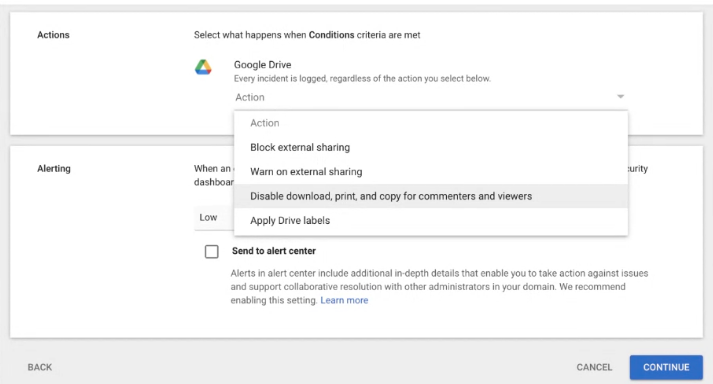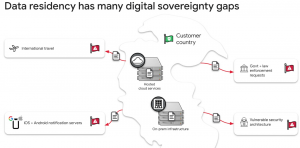 SECURITY
SECURITY
 SECURITY
SECURITY
 SECURITY
SECURITY
Google LLC today announced a set of new features using artificial intelligence to provide more cyber defense controls, most of which will be added to its Workspace cloud platform later this year.
The features cover aspects of implementing zero-trust security, data loss prevention or DLP, and data privacy controls. Many involve a series of automated improvements that will continuously monitor data placed in Google Drive, using its AI engine. Administrators for Workspace, which Google claims is used by 9 million organizations, can set very granular context-aware policy controls, such as checking particular device locations.
 The DLP tool (shown in the screen capture above) has been available in other Google services including Chat and Chrome browsers and will be added to Gmail later this year. The goal is to help business information technology managers to defend against phishing lures that could steal data and account details.
The DLP tool (shown in the screen capture above) has been available in other Google services including Chat and Chrome browsers and will be added to Gmail later this year. The goal is to help business information technology managers to defend against phishing lures that could steal data and account details.
Another set of tools includes enhancements to what Google announced last year, Sovereign Controls in Workspace. These involve preventing third-party data access by extending client-side encryption to mobile versions of Google Calendar, Gmail and Meet.
Another tool is the ability for users to view, edit or convert Microsoft Excel files into GSheets. Google is also working with Thales SA, Stormshield and Flowcrypt to store encryption keys in their respective repositories. Google has not stored and won’t store any of the encryption keys in its own systems.
A final set of tools is also useful in combatting phishing and other threats. Starting later this year, many Workspace account administrators will need to set up additional authorization factors for their accounts. Google stated that it will start with its largest resellers and enterprise customers. It also will add later this year the requirement for multiparty approvals of various high-threat actions, such as changing authentication settings.
Finally, the company said customers can import their Workspace activity and alert logs into Chronicle, Google’s threat data ingestion and anomaly identification tool. For example, Andy Wen, director of product management for Google Workspace, mentioned at a press briefing that an account compromised by a bad actor could see the following two events: a search for active cryptocurrency wallets followed by the creation of a mail forwarding rule to an external account. Chronicle could flag this circumstance as suspect for further investigation.
Many of these features, such as the last one involving Chronicle, have come about thanks to various AI applications that operate under the covers. Jeanette Manfra, Google’s senior director of global risk and compliance for cloud, claimed the AI models will preserve confidential data as part of their operations.
Google cited two of its large customers have been using early versions of this and other security tools, PwC UK and Roche. Tim Ehrhart, domain lead for information security for Roche, gave a testimonial that the new features have “been able to allow our users to use more of Google Workspace for a broader set of scenarios with more confidence in the safety of that work.”
 Wen said the new tools were designed to bridge the gaps of complying with current data residency requirements, especially when international travel is considered (shown adjacent). Google will add the feature to allow customers to choose the location where their data is stored and also where it is processed, or store a copy of their data in a country of their choice, provided it’s either the U.S. or in the EU. There are other granular controls over encryption and data access features as well.
Wen said the new tools were designed to bridge the gaps of complying with current data residency requirements, especially when international travel is considered (shown adjacent). Google will add the feature to allow customers to choose the location where their data is stored and also where it is processed, or store a copy of their data in a country of their choice, provided it’s either the U.S. or in the EU. There are other granular controls over encryption and data access features as well.
Google’s new features are either available now in preview or will be added later this year, with general availability expected next year. Google didn’t provide any cost specifics, although some of the features won’t carry additional subscription costs.
Support our open free content by sharing and engaging with our content and community.
Where Technology Leaders Connect, Share Intelligence & Create Opportunities
SiliconANGLE Media is a recognized leader in digital media innovation serving innovative audiences and brands, bringing together cutting-edge technology, influential content, strategic insights and real-time audience engagement. As the parent company of SiliconANGLE, theCUBE Network, theCUBE Research, CUBE365, theCUBE AI and theCUBE SuperStudios — such as those established in Silicon Valley and the New York Stock Exchange (NYSE) — SiliconANGLE Media operates at the intersection of media, technology, and AI. .
Founded by tech visionaries John Furrier and Dave Vellante, SiliconANGLE Media has built a powerful ecosystem of industry-leading digital media brands, with a reach of 15+ million elite tech professionals. The company’s new, proprietary theCUBE AI Video cloud is breaking ground in audience interaction, leveraging theCUBEai.com neural network to help technology companies make data-driven decisions and stay at the forefront of industry conversations.